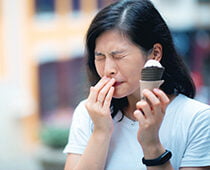
Last Updated on 20th July 2021
The ice cream & ice lolly season is upon us… and for some that means experiencing discomfort from sensitive teeth, say the dentists from Evesham Dental Health Team.
Having sensitive teeth can mean anything from getting a mild twinge to severe discomfort that can continue for several hours. It can also be an early warning sign of more serious dental problems – so get in touch with our Broadway Road dental practice if you have tried treating your sensitive teeth for a few weeks and have had no improvement.
According to the Oral Health Foundation, the UK’s largest oral health charity, many people suffer from sensitive teeth, and it can start at any time. It is more common in people aged between 20 and 40, although it can affect those in their early teens and the over 70s. Women are more likely to be affected.
The part of the tooth we can see has a layer of enamel that protects the softer dentine underneath. If the dentine is exposed, a tooth can become sensitive. This usually happens where the tooth and the gum meet, and the enamel layer is much thinner. It can be caused by:
Dental erosion: this is loss of tooth enamel caused by attacks of acid from acidic food and drinks.
Gums may naturally recede (shrink back) and the roots of the teeth will become exposed and can be more sensitive.
Gum disease: a build-up of plaque or tartar can cause the gum to recede down the tooth and even destroy the bony support of the tooth.
A cracked, broken or chipped tooth or filling where the nerve has become exposed.
To relieve symptoms at home try using a toothpaste specially for sensitive teeth and brush your teeth with it twice a day. You can also rub the toothpaste onto the sensitive areas. If you have any concerns, please get in touch.
 The fact that a quarter of Brits only brush once a day shocks Evesham dentists
The fact that a quarter of Brits only brush once a day shocks Evesham dentists
One in four (26%) British adults regularly brush their teeth only once a day, according to findings of a new nationwide poll highlighted by Evesham Dental Health Team in Broadway Road.
The data has been collected by the Oral Health Foundation and the charity is especially worried by the number of people who regularly fail to brush their teeth last thing at night, when the health of the mouth is most likely to deteriorate.
Latest figures show two-in-three (66%) UK adults have visible plaque, almost one-in-three (31%) have signs of tooth decay, and three-in-four (74%) have had teeth extracted.
The examination into Britain’s brushing habits is part of National Smile Month, a campaign by the Oral Health Foundation that aims to raise awareness about the importance of a healthy mouth.
Dr Nigel Carter, chief executive of the charity, says: “Twice-daily tooth brushing is the cornerstone to having good oral health because it removes plaque. If plaque is not removed and is allowed to build up, it can cause conditions like tooth decay and gum disease.
“Brushing only once a day can increase the chances of developing tooth decay by up to a third, so setting aside time for the second brush is really important.”
Further findings from the charity’s research show that toothbrush skipping is more common in adults under 35s (31%), while men are less likely to brush their teeth twice-daily compared to women.
It also suggests that as many as one million UK adults fail to brush their teeth even once a day.
Enjoy a lifetime of good oral health
The most important action you can take is to brush your teeth for two minutes, last thing at night and first thing in the morning before breakfast, with fluoride toothpaste.
It also means cleaning between your teeth every day with interdental brushes or floss and also cutting down on the frequency of sugary foods and drinks.
Dental disease is largely preventable. Following these steps will set you up on the path for a lifetime of good oral health. For more information, please contact our helpful team.










